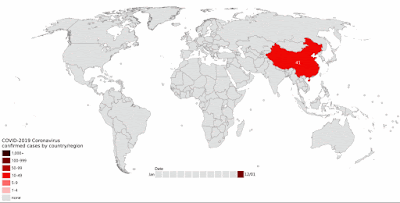Covid-19 comes to Massachusetts, while Connecticut prepares but doesn't panic
As you probably know by now, the world is facing a pandemic in the form of Covid-19 whose course is uncertain except for the assurity that it will get worse before it gets better. According to Dr. Sanjay Gupta of CNN, if contracted it is 20 times as lethal as the flu, even though the annual flu is more pervasive. The older you are, the greater the chance that you will develop the most severe symptoms. Most people will not die from the virus if contracted, but so much is still unknown, as Dr. Gupta would be the first to say.
I have looked at the maps and see that Africa, for example, obviously must have more cases of the virus than are shown. I also reckon that many people may be symptomatic and not reporting, either due to naivety, inability to report (perhaps they are in remote locations or there are financial/language barriers to their being able to report), or fear of being ostracized.
The best place to find information about the Covid-19 pandemic (also called Coronavirus) is the CDC (Centers for Disease Control) website. It also has been translated into Spanish and Chinese. One can sign up for e-mail updates on the virus outbreak, via the CDC site.
As of 10 a.m. today, Feb. 29, there are no documented cases in our state but in Boston there is one case, a student from University of Massachusetts Boston who had traveled to Wuhan, China. The other states with confirmed cases as of now are Arizona, California, Illinois, Washington and Wisconsin.
The CDC states that Covid-19 is spread mainly by person-to-person, and:
- Between people who are in close contact with one another (within about 6 feet).
- Through respiratory droplets produced when an infected person coughs or sneezes.
- These droplets can land in the mouths or noses of people who are nearby or possibly be inhaled into the lungs.
There have been conflicting reports about whether one can catch the virus via a hard surface, but doctors are universally advising people to use hand sanitizers and wash their hands before and after touching door knobs, toilet seats, faucets, etc. when out at public places or when traveling (i.e. train). The CDC says on its website:
It may be possible that a person can get COVID-19 by touching a surface or object that has the virus on it and then touching their own mouth, nose, or possibly their eyes, but this is not thought to be the main way the virus spreads.
On the CT.gov website, they state:
In Connecticut and throughout the world, influenza (flu) activity is high. Unless you have traveled to or from Wuhan, China, or been in close contact with a confirmed infected person for a prolonged period of time, it is likely that symptoms you experience are caused by the flu. The CDC encourages all people aged 6 months and older to be vaccinated. It is not too late to get vaccinated for the flu. Check with your healthcare provider, call your local health department, or visit the HealthMap Vaccine Finder (adults) for availability of flu vaccinations.
CT.gov further advises our citizens take these precautions:
- Wash hands often with soap and water for at least 20 seconds. If soap and water are not available, use alcohol-based hand sanitizer.
- Avoid touching your eyes, nose, and mouth with unwashed hands.
- Avoid close contact with people who are sick.
- Stay home when you are sick.
- Cover your cough or sneeze with a tissue, then throw the tissue in the trash.
- Clean and disinfect frequently touched objects and surfaces.
Find more alerts, information with PDFs from the Department of Public Health and CDC on the CT.gov site.
Visit the CDC website state map
Photo: By Metropolitan - Map base: BlankMap-World-Microstates.svgData: WHO daily situation reportsAnimated GIF: Own work, CC BY-SA 4.0, https://commons.wikimedia.org/w/index.php?curid=86472036




Comments
Post a Comment